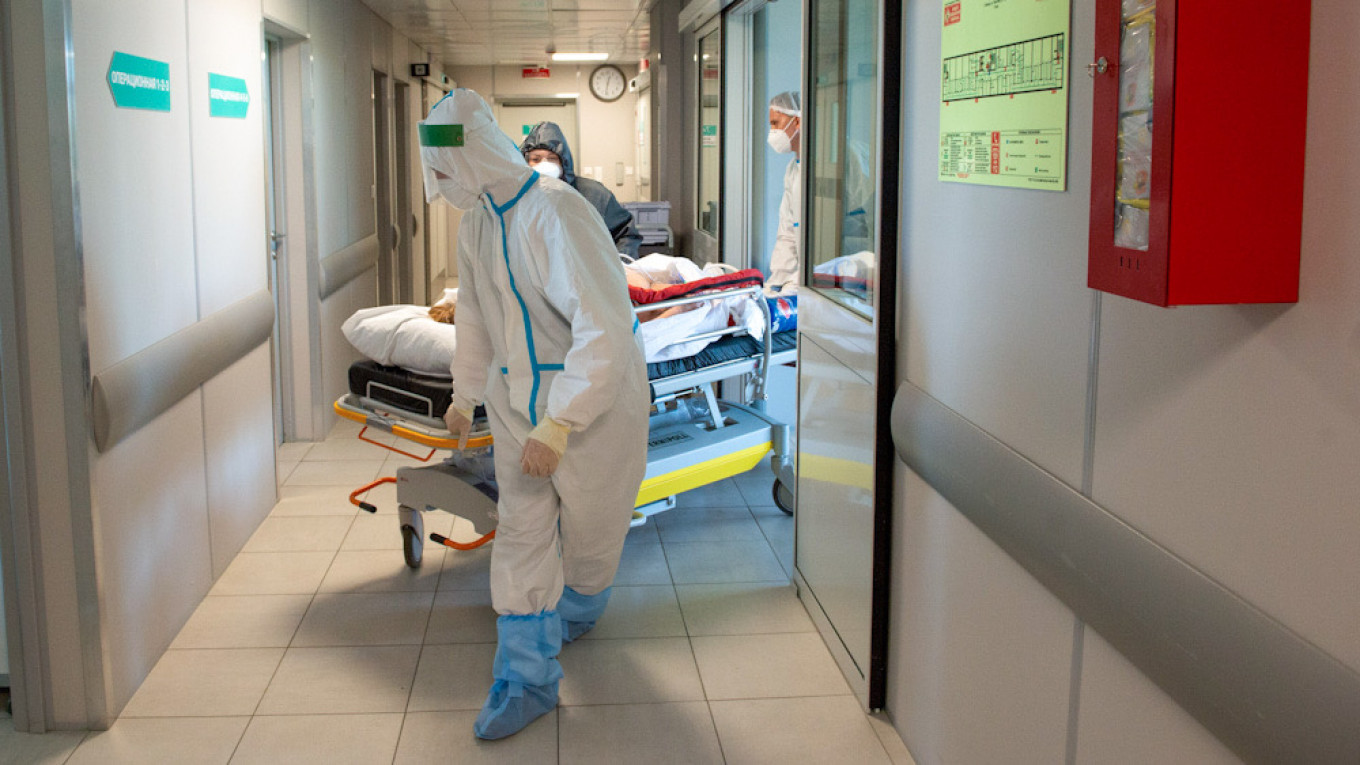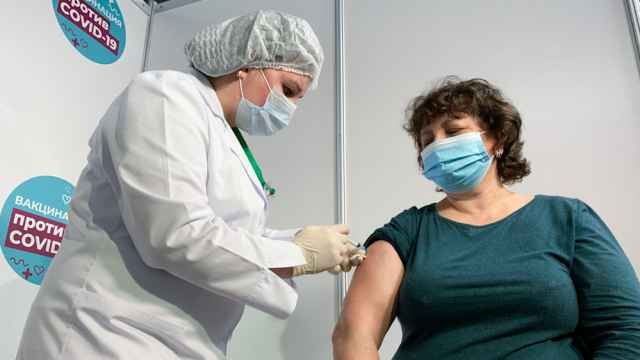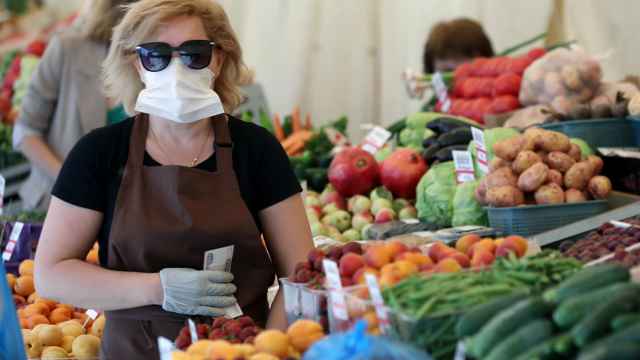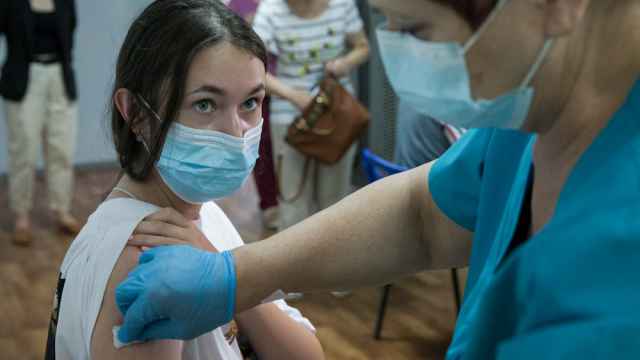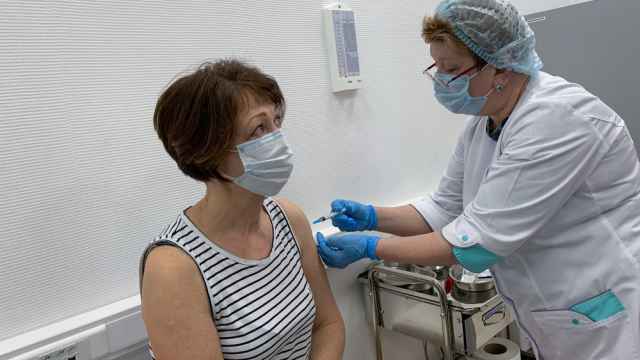Two weeks after 82-year-old Kirill Kruchkov died of Covid-19 in the Tula region, 200 kilometers south of Moscow, his family received a phone call from Rospotrebnadzor, Russia’s state consumer protection watchdog.
“They told us lab tests showed that grandpa died of the Indian strain. I was very confused. He hasn’t been to India,” said his grandson Mikhail, who shared documents showing the results with The Moscow Times.
Like most Russians, the Kruchkov family had heard little of the Delta variant, a highly infectious strain of the coronavirus, first registered in India.
On June 3, a week after their grandfather’s death, Russian officials said just over 1,000 coronavirus infections involving variants had been discovered in Russia, only 24% of them involving the Delta variant.
But it is Delta that is now believed to be behind the explosive rise in infections and hospitalizations in Moscow.
According to government figures, Russia’s capital on Saturday registered 9,120 new coronavirus infections in 24 hours, a record high for a second consecutive day. Moscow Mayor Sergei Sobyanin said that the Delta variant accounted for nearly 90% of the new cases.
“We are starting to go through this story again but with more severe consequences,” Sobyanin told state TV, referring to the intensifying epidemic.
Facing “explosive growth” in the number of infections, officials are setting up new hospital facilities “every day and we barely manage,” he warned.
In response to the spike in cases, officials introduced unprecedented mandatory vaccinations for service workers in the capital.
Previously known as B.1.617.2, the Delta variant was first discovered in India in February, where it contributed to a devastating wave of infections that started in the spring.
Delta is considered the most contagious variant of the coronavirus yet. Studies have shown that it is at least 40% more transmissible than the Alpha variant first detected in the United Kingdom last year, which in turn was about 50% more transmissible than the Wuhan strain
What makes the Delta variant especially dangerous, doctors in hospitals across Moscow said in interviews last week, is that it does not seem to respond as well to treatments previously used on Covid-19 patients.
“The drugs we have been using throughout the pandemic are getting less effective, we have to use large doses,” said Anton, a doctor treating Covid patients in Clinical Hospital Number 52, who asked for his last name to be withheld due to new legislations forbidding medics from talking to the media.
Studies in India have already indicated that antibody drugs and Covid-19 vaccines are less effective against the Delta variant.
“What we did before just isn’t working anymore,” said Yekaterina, a medic working at Moscow’s Clinical Hospital Number 50.
On June 10, the chief doctor of Moscow's flagship Covid-19 hospital, Denis Protsenko, told the Echo Moskvy radio station that patients were not responding to previously effective treatments.
Third wave
Moscow Mayor Sobyanin last week said that officials “did not expect the virus,” saying the arrival of the delta variant had caught the country by surprise.
Vasily Vlassov, an epidemiologist and former adviser to the Russian Health Ministry, disagreed, saying signs of a third wave had been creeping in for a while.
“Clearly, this was expected,” Vlasov told The Moscow Times.
“This is a result of having virtually no restrictions for months while the virus was around.”
Until last week, Russia had few coronavirus restrictions, with concert halls, nightclubs, and restaurants full to capacity. Earlier this month, Russia hosted the St. Petersburg annual economic forum, and the city has also welcomed thousands of foreigners from across the world for the Euro 2020 football championship.
However, a graph of Covid-19 hospitalizations from the capital’s flagship Kommunarka hospital shows that hospitalizations in Moscow have been high for months.
As Russian officials rarely study and publish data on virus variants, Vlasov said, it remains unclear how and when Delta started to spread in the country.
Early in May, Russian local officials confirmed the first cases of Delta within the country’s borders after a group of Indian students arrived in Ulyanovsk between April 17-30. The national headquarters of Rospotrebnadzor later denied the presence of the Delta strain among the students.
And despite the virus raging in India, Russia ran flights to and from the country at least twice a week throughout 2021. Passengers on flights arriving from Delhi were not told to self-isolate in Russia.
Sputnik V
The official Twitter account of Russia’s Sputnik V vaccine said on June 15 that it is more effective against the Delta variant than any other vaccine that has so far published results on the strain. It also said it has submitted results for publication in an international peer-reviewed journal to be published shortly
Vaccine experts told The Moscow Times it is not possible to assess Sputnik’s efficiency without sufficient data, but questioned the assertion that it is “the best.”
“I’m very skeptical of any claims that suggest Sputnik V is the absolute best vaccine,” said Jeremy Kamil, Associate Professor of Microbiology and Immunology at Louisiana State University Health Shreveport.
Studies so far have shown that Western vaccines are highly effective at preventing hospitalization with the Delta variant after two doses, with mRNA-based vaccines, like Pfizer being slightly more effective than adenovirus vector technology vaccines, like AstraZeneca and Sputnik V.
A real-world study undertaken by Public Health England showed the Pfizer shot was 96% effective against hospitalization after two doses, while the AstraZeneca shot was 92% effective.
Russian and foreign vaccine experts said they also believed Sputnik V was likely to be effective against hospitalization and death with Delta.
“Sputnik does seem to be a pretty good vaccine,” said Kamil.
“All the public needs to know is that both adenovirus and mRNA vaccines have shown effectiveness against severe infections,” he added.
Fast transmission
More worrying for Russia, however, according to experts, is early research indicating that Delta appears to transmit faster, even among fully vaccinated groups.
In India, Delta was responsible for most “breakthrough infections” — infections that occur after full vaccination — among healthcare workers.
The U.K. has also seen a spike in infections, despite having almost 80% of its adult population vaccinated. However, hospitalizations and deaths in the U.K. have not proportionally increased with the rise in infections, which points to the effectiveness of vaccines.
Mayor Sobyanin warned on Sunday that Russians should expect infections even after two vaccine shots.
“The level of immunity in order to protect oneself from the Indian strain needs to be twice as high as from the Wuhan one. Therefore, we see reinfection, we see illnesses in those who have been vaccinated,” he said.
Russia, which has only vaccinated 13% of its population, is now presented with the daunting challenge of fending off the infectious Delta variant in a country that at its current pace will take over a year to reach herd immunity.
"We need to get vaccinated as quickly as possible because then a barrier will be built, a shield," Sobyanin added.
Early reports published by health officials last Friday show that vaccination in Moscow has increased fourfold since it was made mandatory for service workers. But with only 23% of Russians supporting compulsory vaccination and a third of all medics refusing the jab, the Kremlin appears to be facing an uphill battle to get its nation mobilized for vaccination.
“A low immunization rate jeopardizes the population for any Covid infection, variant or not, and whatever is circulating will continue unless the level of immunity in the population is raised,” said Ian Jones, a virology professor at the University of Reading in the U.K.
Yekaterina, the medic working on coronavirus frontlines said she feels time is running out to get the country immunized.
“Right now we are facing a race against the clock. And the clock looks to be accelerating.”
Jake Cordell and Spencer Michaels contributed reporting.
A Message from The Moscow Times:
Dear readers,
We are facing unprecedented challenges. Russia's Prosecutor General's Office has designated The Moscow Times as an "undesirable" organization, criminalizing our work and putting our staff at risk of prosecution. This follows our earlier unjust labeling as a "foreign agent."
These actions are direct attempts to silence independent journalism in Russia. The authorities claim our work "discredits the decisions of the Russian leadership." We see things differently: we strive to provide accurate, unbiased reporting on Russia.
We, the journalists of The Moscow Times, refuse to be silenced. But to continue our work, we need your help.
Your support, no matter how small, makes a world of difference. If you can, please support us monthly starting from just $2. It's quick to set up, and every contribution makes a significant impact.
By supporting The Moscow Times, you're defending open, independent journalism in the face of repression. Thank you for standing with us.
Remind me later.



